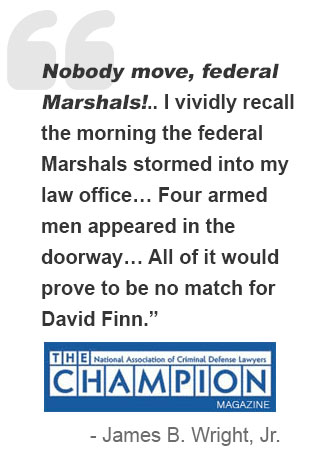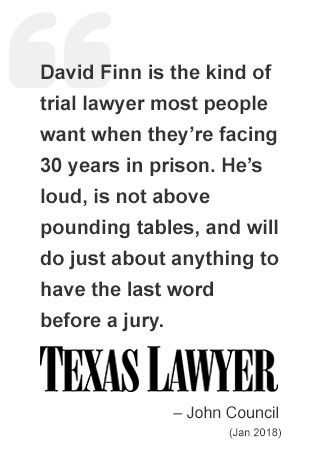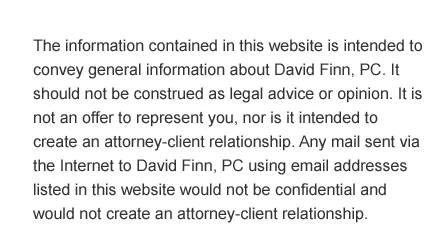


Library of Motions – Comparison Between State Criminal Practice And Federal Criminal Practice
COMPARISON BETWEEN STATE CRIMINAL PRACTICE
AND FEDERAL CRIMINAL PRACTICE
by George R. Milner, III
Milner & Finn
Dallas, Texas
www.milnerfinn.com
I. Introduction
This article will analyze and compare federal criminal practice with state criminal practice. This article is intended to be an overview, as opposed to an in-depth analysis. It is designed to be a primer for attorneys who are well versed in state criminal practice and are beginning a federal criminal practice. There are many distinctions between practice in federal court as opposed to state court. However, the fundamental procedures are generally the same. The trial procedures are very similar. Practice in the federal courts tend to be more formal, whereas practice in state court may be more informal. This will obviously vary depending upon the particular judge, whether it be state or federal court. The federal constitutional principals are obviously identical .
The beginning of the process in a state representation frequently begins with the arrest of your client. The client then hires an attorney to represent him or her in the anticipated criminal accusation. A federal criminal action could begin the same way. However, it is much more common that the client, known literally as a target, is aware of an on-going criminal investigation. The client frequently will hire an attorney during this investigative process. If the client has the slightest level of intelligence, he will immediately retain counsel upon learning of the existence of the investigation. Generally speaking, in the state system, the government arrests first, and then investigates. In the federal system, the government investigates first and then executes an arrest. Representation of a client in a federal criminal case is well beyond the scope of this article. This article is intended to only address the practical distinctions between state and federal practice.
In the state system, an individual is arrested and then brought before a magistrate who will arraign the accused and set bail. This is principally done in an ex-parte manner with input generally only coming from the police. In the federal system, the bail process is non-pursuant to the Bail Reform Act of 1984. The accused will be brought before a magistrate for an initial appearance. Both the government and the defendant may present any evidence believed to be relevant to the issue of bail. Additionally, the Probation Department will prepare a pre-trial services report. This report is confidential as a matter of law. It is essentially a short background report regarding your client. If possible, you should be present with your client when the officer interviews him or her. You may direct the client to not answer questions if you believe those answers may be incriminating, or otherwise provide evidence to the government. Although this report is confidential as a matter of law, and it is required that the report remain with the magistrate judge, the prosecutor will obviously read it. If your client is being prosecuted for a financial crimes offense, you may not want your client to answer questions regarding his finances.
The next distinction is the federal preference toward personal recognizance bonds. In the state system, bail is typically set at some dollar amount which must be posted in cash or by a bonding company. The magistrate may require that a surety or a cash bond or some other type of security be posted with the court. However, the clear preference is to release the accused on his or her own recognizance, if the person is going to be released at all. It is quite common in the federal system for the magistrate to order the “detention” of your client pending trial. If the magistrate detains your client, you may appeal this decision to the relevant District Judge. The procedure is to file a motion to revoke the magistrate’s pre-trial detention order. United States v. Ruben Rueben, 974F2D580, 585 (5th CIR. 1992) cert denied, 507 US940 (1993). The District Court’s review of the magistrate’s order is conducted de novo.
The next process is the grand jury indictment. In the state system, a grand jury is comprised of twelve citizens who reside in the relevant county, and who represent a cross section of the community. Nine people constitute a quorum. And, it is only required that nine members of the grand jury vote affirmatively to return an indictment. Alternatively, a federal grand jury must consist of at least sixteen, but not more than twenty three people. Fed. R. Crim. P.6 (a). An indictment requires only the affirmative vote of twelve or more jurors.
The distinctions between the grand juries at the federal and state level go well beyond the number of jurors. A typical state grand jury will generally only hear brief testimony addressing whether there is probable cause to believe that an individual committed an offense or offenses. On the other hand, federal grand juries have extremely broad investigative power. A grand jury may “investigate merely upon suspicion that the law is being violated, or even just because it wants assurance that it is not.” United States v. R. Enterprises, Inc., 498 U.S. 292, 297 (1991) (“United States v. Morton Salt Co., 338 U. S. 632, 642-43 (1950)). Although the grand jury was at one time designed to protect the individual from the government, that is clearly no longer the case. The grand jury is the weapon of the prosecutor. The grand jury has the ability to subpoena documents and witnesses. Federal prosecutors will essentially nail their case down with sworn grand jury testimony. In the state system it is customary in many counties for the defense attorney to submit written materials or documents to the grand jury for consideration. It is likewise common for defense counsel to make witnesses available to testify before the grand jury, if the attorney deems it helpful. However, the direct submission of any materials or documents to a federal grand jury is, itself, a federal criminal offense.
II. Pre-Trial Issues
A. Arrest
Texas law imposes no constitutional requirement to affect an arrest. Hulit V. State, 982 S.W 2d 431 (Tex. Crim. App. 1998) Tex. C. Crim P., Art. 14 provides for various situations where a peace office may or shall make a warrantless arrest. The same chapter provides for situations in which a private citizen may affect a warrantless arrest.
The federal system provides no such statutory provision for warrantless arrests. An arrest must simply be supported by a probable cause. Draper V. United States, 358 U.S. 307 (1959). Most federal arrests, however, will be made pursuant an arrest warrant. Warrantless arrests will be substantially mor common in the state system.
B. Bail
Under Texas law, whenever an individual is arrested, he or she has been brought before a magistrate who will arraign the accused and set bail. The arrested person has a right to reasonable bail. See U.S. Const., Amend. VIII; Tex. C. Crim. P., Art. 17. Bail is principally done in an ex parte manner with input generally coming only from the police.
The federal system is substantially different. At the outset, your client still has the same constitutional right to bail pursuant to U.S. Const., Amend. VIII. However, in spite of that, the bail process is conducted pursuant the Bail Reform Act of 1984. Depending upon the accusation, your client may never be permitted to make a bond. Once a person is arrested, he or she will be brought before a magistrate for an initial appearance. Both the government and the defendant may present any evidence believed to be relevant to the issue of bail. Additionally, a pre-trial Services officer will prepare a report for the court. This report is confidential as a matter of law. It is essentially a short background report regarding your client. If possible, you should be present with your client when the officer interviews him or her. You may direct the client not to answer questions if you believe those answers may potentially incriminate your client. Although the report is confidential, and it is required that the report remain with the court, the prosecutor will obviously read it. The Assistant United States Attorney is not likely to forget what he or she has read. You need to carefully consider what information is being provided and its potential impact on the case. By way of example, if your client is being prosecuted for a financial crimes offense, you may not want your client to answer questions regarding his personal finances.
Contrary to Texas practice, the federal system has a preference toward personal recognizance bonds. Under Texas law, bail is typically set at some dollar amount which is posted either in cash or by a bonding company. A federal magistrate may like wise require the posting of a surety or cash bond, or some other type of security. However, the clear preference is to release the accused on his or her own recognizance, if the person is going to be released at all.
It is not at all uncommon for defendants to be “detained” prior to trial. If the magistrate orders your client detained, he or she will be held in custody until trial. You may appeal the magistrate’s decision to the relevant district judge. This affected by filing a motion to revoke the magistrate’s pre-trial detention order. United States V. Rueben, 974 F.2d 580 (5 th Cir. 1992), cert. denied, 504 U. S. 940 (1993). The district court’s review is conducted de novo. Both federal and Texas law permit the court to set reasonable conditions of release to protect the community and secure the appearance of the accused.
C. Indictment
Texas law provides that a grand jury shall be comprised of twelve grand jurors and two alternates. Tex. C. Crim. P., Art. 19.18. A quorum is comprised of nine grand jurors. Tex. C. Crim. P., Art. 19.40. Grand jury proceedings shall be secret. Tex. C. Crim. P., Art. 20.02. Although the concept of the grand jury might be similar under Texas law as compared with federal law. There is vast difference between the application of the grand jury. In the state system the grand jury is principally used to screen criminal accusations. Cases are presented and the grand jurors deliberate and vote whether to indict. It is only required that nine jurors vote affirmatively in order to return an indictment. Tex. C. Crim. P., Art. 20.19. Generally speaking, the state grand jury s not used to pro-actively investigate criminal matters. Cases are presented to the grand jury by the relevant district attorney, and the grand jury decides whether to return an indictment. Further, Texas law does not proscribe communication with the grand jury by defense counsel. This is commonly done by delivering written information to the prosecutor to present to the grand jury.
The federal grand jury is substantially different. The federal grand jury is not a screening mechanism for criminal prosecutions. On the contrary, the federal grand jury is the weapon of the prosecutor. A federal grand jury possesses extremely broad investigative power. A federal grand jury may “investigate” merely upon suspicion that the law is being violated, or even just because it wants assurance that it is not.” This cited in United States v. R. Enterprises, Inc., 498 U. S. 292, 297 (1991). Although the grand jury was at one time designed to protect the individual from the government, those days have clearly passed. The grand jury has the power to subpoena documents and witnesses. Federal prosecutors tend to thoroughly investigate their cases through sworn grand jury testimony and documents obtained pursuant to subpoena. Contrary to Texas state law, the direct submission of any written materials or documents to a federal grand jury is, itself, a federal criminal offense.
D. Speedy Trial
There is no valid statutory act requiring a right to a speedy trial. Meshel v. State, 739 S.W. 2d 246 (Tex. Crim. App. 1987). Texas law applies the 6 th amendment standard as interpreted by the seminole case Barker v. Wingo, 407 U.S. 514, 92 S. Ct. 2182, 33 L. Ed. 2d 101 (1972). There is no bright line rule and no inflexible test. However, the court must consider the length of delay, the reason for delay, assertion of the right to a speedy trial by the defendant, and any prejudice to the defendant due to the delay.
Federal law provides for a statutory speedy trial right. See 18 U.S.C. § 3161. This statutory speedy trial right commences upon rest of the accused for a federal, not state, offense. United States v. Adams, 694 F. 2d 200 (9 th cir 1982). The indictment must be returned within 30 days of arrest. The trial must commence within 70 days of the latter of either indictment or initial appearance. No trial may commence prior to 30 days from indictment or initial appearance. The court has the authority to dismiss, either with or without prejudice, an indictment based upon violations of this statutory speedy trial right. There are a number of enumerated factors which the court must consider.
The statutes provide for the exclusion of time which is due to a number of enumerated factors which the court must consider. The statutes provide for the exclusion of time which is due to: 1.) a competency examination of the defendant; 2.) times during which the defendant is mentally or physically incompetent; 3.) time during which the defendant is in drug treatment with a prosecution deferral ; 4.) any time during which an inter-lockatory appeal is proceeding; 5.) pending pre-trial motions; 6.) time caused by transferring the case or removal of a defendant from another district; 7.) time during which the court considers any plea agreement; 8.) time during which prosecution is deferred by the government; 9.) time during which the defendant or an essential witness is absent; 10.) A “reasonable period “ of delay when the defendant is joined with co-defendants whose speedy trial has not run; 11.) time during which “ the ends of justice ellipsis outweighs the best interest of the public and the defendant in a speedy trial” because of (a) an unusual or complex case or (b) because of continuity of counsel for the government or defendant.
It is important to assume in federal court that you may not be able to obtain a continuance. This is true even if the government does not oppose the defendant’s motion for continuance. The trial court is constrained by the Speedy Trial Act. It is important that you review the statutory provisions thoroughly and address them in your motion for continuance.
E. Joinder
Texas law provides that a defendant may be prosecuted in a single criminal transaction for all offenses rising out of the same criminal episode. Tex. C. Crim. P., Art.3.02.
Federal law provides for broader joinder of offenses. An indictment or information may charge a defendant with two or more offenses, whether felonies or misdemeanors or both, if the offenses are of the same or similar character, or are based on the same act or transaction, or are connected with or constitute parts of a common scheme or plan. Fed. R. Crim. P. 8 Rule 8 is broadly construed in favor of initial joinder.United States v. Davis, 752 F. 2d 963 (5th cir. 1985) Essentially, joinder is proper if the offenses occurred over a relatively short time period and share some evidentiary matters. United States v. Lueben, 812 F. 2d 179 (9th cir. 1987)
F. Severance
Texas law provides a broad right of severance. Generally speaking, a defendant has an absolute right to a severance of offenses which have been consolidated or joined for trial. Tex. Penal C. § 3.04 However, there is a potential catch. Texas law generally provides that if a defendant is convicted of more than one criminal offense in one trial proceeding, the sentences generally must run concurrently, as opposed to consecutively. Tex. Penal C. § 3.03 (a) if, a defendant elects to sever offenses which have been joined for trial, the court in its discretion may order the sentences to run concurrently or consecutively. Tex. Penal C. § 3.04(b) counsel must give grave consideration before asking for a severance.
There are other limitations upon the broad right of severance under Texas law. Generally, sex offenses may not be severed. The specific offenses are listed in Tex. Penal C. § 3.03 (a) if the relevant offenses are enumerated in section 3.03 (b) the court, before ordering a severance, must determine that either the state or defendant would be unfairly prejudiced by a joinder of the offenses. Tex. Penal C.§ 3.04 (c)
F ederal law provides a limited right to a severance. If joinder of offenses or defendants appears to prejudice the government or a defendant, the court may sever the defendant’s trials, order separate trials as to separate counts, or provide any other relief that justice requires.Fed. R. Crim. P. 14. Pursuant to Fed. R. Crim. P. 12 (b) (5), a motion to sever must be made prior to trial. It should be recognized that federal judges appear to not enjoy trials. Likewise, federal judges appear to enjoy multiple trials substantially less. Accordingly, unless you can make a firm showing of overwhelming prejudice, you should expect to have all criminal offenses and defendants tried together in one proceeding.
G. Discovery
Discovery in Texas state courts is generally covered by Chapter 39 of the Code of Criminal Procedure. A state court defendant’s right to discovery is, in most situations, provided by Tex. C. Crim. P., Art. 39.14. The defendant in state court, generally has right to examine physical evidence. The defendant has no right of discovery to witness statements, whether written or oral, or work – product of the prosecutor.
Texas law also provides both the state and defendant a right to notice of expert witnesses. See Tex. C. Crim. P. Art. 39.14 (b). Texas law also provides a defendant reasonable notice upon request, not a motion, to the state’s intention to offer evidence of extraneous wrongs, crimes or bad acts, either at the guilty/not guilty phase or the punishment phase. See Tex. R. Evid. 404 (b) and Tex. C. Crim. P., Art. 37.07 Discovery in federal court is pursuant to Fed. R. Crim. P., 16. However, it is important to completely familiarize yourself with the relevant judge’s pre-trial order. Frequently, a judge will enter a pre-trial order which addresses discovery issues. Filing a motion for discovery will advise the court you have not read the court’s order. If there is no discovery order issued by the court, The right to discovery is triggered by defense motion. However, counsel should be aware this will trigger reciprocal discovery requirements by the defense. Generally, the defense is entitled to the defendant’s written or oral statements, the defendant’s prior record, any documents and objects which the government either possesses or controls, if they are material to preparing the defense, or the government intends to use them in its case – n – chief at trial , or the item was obtained or belongs to the defendant; the reports of examinations and tests; expert witnesses. Fed. R. Crim. P., 16 The defense is not entitled to witness statements, except as provided by 18 U. S. C § 3500. And, the defense is not entitled to grand jury transcripts, except as provided by Fed. R. Crim. P. 6, 12 (h), 16 (a) (1), and 26.2.
H. Plea Negotiation
Plea negotiations in Texas courts are substantially different than in federal court. At the outset, plea negotiation in state court is almost universally conducted after indictment. Additionally, plea negotiations in Texas courts is typically binding upon the parties, but not upon the court. It is quite similar to contractual negotiations. The state and defense may essentially negotiate the precise sentence which the defendant will receive based upon his plea of guilty or no contest. The court is not bound by the agreement. However, in district court, the defendant has the right to withdraw his plea if the court advises that it will not follow the agreement between the parties. And, in the vast majority of the cases, the trial court will follow the agreement between the state and the defendant.
On the other hand, plea negotiations are typically done prior to indictment in federal representations. If a satisfactory plea agreement is going to be reached in federal court, it generally must be consummated prior to indictment. An indictment reduces the number of sentencing options. At the outset, counsel may negotiate a charge bargain. This means defense counsel negotiates an agreement with the government to only charge the defendant with a specific criminal offense. Generally, this is done in order to charge the defendant with a criminal offense which has a lower statutory maximum punishment than other offenses which could be charged by the government. This charge bargaining is not as readily available as it once was. Former Attorney General John Ashcroft directed prosecutors charge defendant’s with the most severe, readily provable offense. Charge bargaining, accordingly, may be limited depending upon the particular prosecutor’s adherence to this directive.
Contrary to Texas law, there is rarely an agreement to a specific sentence in federal court. Sentencing is done pursuant to the Sentencing Reform Act of 1984. This act made the United States sentencing guidelines applicable to all sentences in federal court. Essentially, the defendant will plead guilty to one or more criminal offenses. The court will advise the defendant that sentencing will be determined by application of the United States sentencing guidelines. The defendant will be advised that except for the statutory maximum, no one can determine what the specific sentence will be. The defendant will be advised that if the sentence is substantially higher than the defendant believed it would be, he will not be able to withdraw his plea.
Your client will then meet with a probation officer for a pre-sentence interview. The probation officer will do a thorough background report on the client. The probation officer will also communicate with the prosecutor and relevant enforcement agents. The probation officer will then prepare a pre-sentence report which will advise the court of the relevant sentencing guidelines and will provide the court with a specific guideline range of punishment. Both counsel for the government and the defendant will have the right to object to this report. In the end, the judge will make the final decision as to which guideline provisions are applicable and sentence the client within the relevant range.
It is important to understand the probation officer has been well trained to understand every conceivable way to increase, not decrease, the guideline range. The client should be made to understand this.
I. Pre-trial Motions
The filing and urging of pre-trial motions in state court is reasonably similar to the process in federal court. Whether you are in state or federal court, it is imperative that you be familiar with the particular court’s scheduling, orders, and/or procedures. Many courts, both in state and federal court, have standing pre-trial orders. Many state courts will have an informal process, and will not require that pre-trial motions be scheduled by any particular day. Some state courts will schedule a pre-trial hearing. If there is a pre-trial hearing date, and the court has not ordered that motions be filed by a particular day, then all pre-trial motions should be filed at least seven days prior to that date. Tex. C. Crim. P., Art. 28.10 Sec. 2. The substantial difference in federal court is that the process will be somewhat more formal. You will almost always be given a scheduling order imposing a deadline for the filing of pre-trial motions. It is likely that you may never receive a live hearing on the motions. And, unlike state court, boiler plate motions should not be used. It may be customary to file boiler plate motions in state court. And, given the volume of cases heard by state judges, the practice is neither impractical nor discouraged. A motion filed in state court should simply and briefly show the relief sought. The better practice is to tailor your motions to the specific case, but the court can ascertain the relief sought and grant or deny the relief.
The practice in federal court is more time consuming. All pre-trial motions should be tailored specifically to the relevant facts and legal issues raised by the particular case. Additionally, counsel should carefully review the local rules of the district. Many pre-trial motions require submission of a brief or memorandum of law in support of a motion. Counsel should understand that the pre-trial motion and supporting brief may be the only argument you will make to the court. Never assume that you will be permitted a live hearing or oral argument. If factual support is necessary, you should attach supporting documents and/or affidavits, if necessary.
Additionally, most federal districts will require the moving party to consult with the attorney for the opposing side. This means all pre-trial motions must be discussed with the opposing attorney. You are generally required to ask whether the opposing attorney agrees to the granting of the motion. You will then attach a “certificate of conference” to your pre- trial motion. The certificate of conference will verify that you have discussed the motion with the opposing attorney, and state whether the opposing attorney agrees to or opposes the granting of the particular motion.
There is another fundamental distinction between state court and federal court. Unlike state court, motions filed in federal court will be thoroughly read. If they are not completely read by the judge, they certainly will be read carefully by the clerks.
III. Fourth Amendment Issues
Arguably, Texas provides greater protection from unreasonable search and seizure than the Fourth Amendment.See Heitman v. State, 815 S.W.2d 681 (Tex. Crim. App. 1991) In any given case, counsel should thoroughly research whether evidence was obtained in either of the Texas or U.S. Constitutions. However, there are some general distinctions between Texas law and U.S. law in the area of search and seizure.
If a search warrant is found to be defective, Texas does not permit a good faith exception to the exclusionary rule. See Tex. C. Crim. P., Art. 38.23 (b). A search warrant affidavit must provide probable cause. Gordon v. State, 801 S.W.2d 899 (Tex. Crim. App. 1990) On the other hand, federal law permits a good faith exception to the exclusionary rule. See United States v. Leon, 468 U.S. 897, 104 S. Ct. 3405, 82 L. Ed. 2d 677 (1984).
In federal court, there is an inevitable discovery doctrine permitting an exception to the exclusionary rule. See Nix v. Williams 467 U.S. 431, 104 S. Ct. 2501, 81 L. Ed. 2d 377 (1984). However, Texas law does not permit inevitable discovery as an exception to the exclusionary rule. See Garcia v. State, 829 S. W. 2d 796 (Tex. Crim App. 1992); State v. Daugherty , 931 S.W. 2d 268 (Tex. Crim App. 1996) (Reh’g. Denied)
The exclusionary rule in Texas courts applies to the conduct of government agents and private citizens. SeeTex. C. Crim P., Art. 38.23 State v. Johnson, 939 S. W. 2d 586 (Tex. Crim App. 1996). The burden on the government is different when consent to search is at issue. In Texas courts, the state must prove consent by clearing convincing evidence. State V. Ibarra , 953 S.W.2d 242 (Tex. Crim App. 1997). However, in federal courts, the government must only prove consent by a preponderance of the evidence. United States v. Matlock , 415 U.S. 164, 94 S. Ct. 988, 39 L. Ed. 2d 242 (1974).
IV. Fifth Amendment Issues
Texas law provides that the admissibility of confessions is controlled by the Fifth Amendment and Tex. C. Crim P., Art. 38.22. Generally speaking, statements by the accused which are the product of custodial interrogation, must be written or recorded. On the other hand, there is no such requirement for a confession to be admitted in federal court. The issue to be determined by the court is whether the statement was freely and voluntarily made. Generally speaking, if the agents complied with Miranda and did not beat the defendant senseless, a court will find the statement to have been made freely and voluntarily.
V. Disclosure of Defenses
A. Alibi
Texas law does not regard alibi as a defense. This is simply a factual scenario which is inconsistent with the state’s case. An alibi is simply offered to rebut the state’s case. There is no requirement that the defendant provide notice to the state of the intention to assert an alibi.
However, the defendant may have to provide notice to the government of the defendant’s intention to assert alibi as a defense. See Fed. R. Crim. P., 12.1. The government must request said notice in writing. The request must state the time, date, and place of the alleged offense. Fed. R. Crim. P., 12.1 (a) (1). Upon such request, the defendant must, within 10 days of the request or any time designated by the court, serve written notice on the government of any intended alibi defense. The defendant’s notice must state each specific place where the defendant claims to have been and the name address and telephone number of each alibi witness on whom the defendant will rely. Fed. R. Crim P., 12.1 (a) (2). The defendant may then request information pertaining to witnesses who establish the defendant’s presence at the scene of the alleged offense and government rebuttal witnesses. If either party fails to comply, the court may exclude testimony of undisclosed witnesses.
B. Insanity
Insanity is an affirmative defense under Texas law. Tex. Penal C. § 8.01 The defendant must provide at least ten days prior to trial or pre-trial hearing of the intent to assert insanity as a defense. Tex. C. Crim. P., Art. 46.03. If the defendant fails to provide the required notice, the court will not permit assertion of the insanity defense unless “ good cause” is shown .
A defendant in federal court must provide written notice to the government of his intention to assert an insanity defense. This notice must be provided at the time pre-trial motions are filed, or at any time designated by the court. Fed. R. Crim P., 12.2 (a). The government may then compel, pursuant to Rule 12.2 (c). The defendant to submit to a competency examination under 18 U.S. C.§ 4241 (statute pertaining to determination of mental competency to stand trial)
C. Duress
Texas law provides that duress is an affirmative defense which the defendant must prove by a preponderance of the evidence. Charles v. State, 636 S.W. 2d 5, 6 (Tex. App. -Dallas 1992) (pet. ref’d) The federal law is substantially different. The initial burden of production rests upon the defendant. The defendant must make a prima facie showing of duress. However, once that is done the burden shifts to the government to affirmatively disprove duress beyond a reasonable doubt. United States v. Falcon, 766 Fed. 2d 1469, 1477 (10 th cir. 1985).
VI. Trial
A. Jury Selection
Each side is permitted ten peremptory challenges in a non-capital felony trial in Texas. Tex. C. Crim P., Art. 35.15 (b). Both parties are entitled to three peremptory challenges in a misdemeanor case tried in a county court. Tex. C. Crim. P., art. 35.15 (c) The parties are entitled to five peremptory challenges in a misdemeanor case tried in a district court. Id. Additionally, article 1 section 10 of the constitution provides the right of counsel to question the venire in order to intelligently exercise peremptory challenges ex parte McKay , 819 S. W. 2d 478 (Tex. Crim App. 1990). The ability to properly question the jurors will be the fundamental distinction between the state and federal court. Counsel for both the state and defendant are generally permitted to adequately question the panel. This is not the case in federal court. Many federal judges will not permit the attorneys to conduct voir dire. Those judges who do tend to severely limit the amount of time which may be utilized to question the venire.
Federal law provides the defendant with ten peremptory challenges, and the government is entitled to six to cite Fed. R. Crim P., 24. However, if there multiple defendants, the defense will still only be entitled to ten peremptory challenges which must be shared among the defendants. The court has the authority to grant additional peremptory challenges. The court may empanel up to six alternates, and each side will be entitled to one additional peremptory challenge in the alternate zone. The court is not required to permit individual questioning by the attorneys. United States v. Segal, 534 Fed. 2d 578 (5 th cir.1976). The trial court has almost limitless discretion in the conducting of voir dire. Mu’Min V. Virginia 500 U.S. 415, 111 S. Ct. 1899, 114 L. Ed. 2d 493 (1991).
You will generally provide the court with a list of requested voir dire questions. The judge will then determine which questions will be asked. The court may ask questions which were not submitted by either party. Typically, the judges will tend to ask questions which elicit yes or no answers, as opposed to questions designed to elicit opinions. In short, the information upon which you base your challenges will be very limited in federal court, as opposed to state court.
B. Witness Statements
Tex. R. Ev. 615 controls the production of witness statements in criminal cases. The rule generally allows a party which did not call a witness to compel the production of any statement given by the witness which relates to the subject matter concerning which the witness testified. The party requesting production of the statement has the right to a recess of the proceedings in order to examine the statement for use in the trial. Tex. R. Ev. 615 (d). If either party fails to produce such a statement, the court shall strike the testimony of the witness. And, if the state elects not to comply, the court shall declare a mistrial if required by the interest of justice. Tex. R. Ev. 615 (e). The federal rule is virtually identical to the Texas state rule regarding production of witness statements after the defendant has testified. See Fed. R. Crim P., 26.2. the production of government agent and witness statements is also controlled by the Jencks Act. See 18 U.S. C. § 3500. This rule essentially provides that any type of statement made by a witness or perspective government witness is not subject to compelled disclosure until the witness has testified on direct examination in the trial. See 18 U.S. C. SS 3500.
C. Accomplice Testimony
Texas law places restrictions upon the sufficiency of accomplice testimony. A conviction is not sufficient if based upon accomplice testimony, unless it is corroborated by other evidence tending to connect the defendant with the offense. Tex. C. Crim. P., Art. 38.14.The corroborating evidence will, itself, be insufficient if it merely shows the commission of the crime. Id.
Federal law places no such protections upon the accused. A conviction can be based upon uncorroborated testimony of an accomplice. The jury will be given a specific charge to consider such testimony with caution, and only consider it if you believe it beyond a reasonable doubt. Accordingly, if the jury believes the uncorroborated accomplice testimony, this is sufficient to sustain a conviction.
D. Jury Charge
There are fundamental differences between state and federal court as it relates to the jury charge. Texas law provides that a written charge distinctly setting forth the law applicable to the case and not expressing any opinion as to the weight of evidence be given to the jury. See Tex. C. Crim. P., Art. 36.14. Both the state and defendant have the right to object to portions of the charge, and to request special charges be included in the court charge. Tex. C. Crim. P., Art. 36.15. The procedure for submitting requested charges is somewhat similar to a federal trial. However, you will generally submit your requested jury instructions to the court prior to trial in federal court.
E. Motion for Judgement of Acquittal/Directed Verdict
Texas law provides the defendant an opportunity to move the court to direct the jury to return a verdict of not guilty. This is called a motion for a directed verdict. This motion is made outside the presence of the jury after the state has rested its case-in-chief. The issue before the court is whether the state has produced some credible evidence proving each and every element of the offense. The court will not make determinations as to the weight to be attributed to any particular evidence. And, the evidence is viewed in a light most favorable to the state. However, if the record is devoid of any evidence proving an element, the defense is entitled to a directed verdict. The court will then prepare a charge which instructs the jury to return a verdict of not guilty. It is not required that the defendant make such a motion. However, it is in the defendant’s best interest to do so.
The federal procedure is different. And, it is very important that the appropriate motion be made, and re urged at the appropriate times. The federal motion is called a motion for judgement of acquittal . See Fed. R. Crim. P. 29. The defendant in federal court must move for a judgement for acquittal at the close of the government’s case. If the motion is denied, the motion should be re urged at the close of all the evidence. If there is a guilty verdict, the defendant must renew the motion for judgement of acquittal within seven days after the guilty verdict. See Fed. R. Crim. P. 29 (c) This motion is not required. However, it will substantially change the standard of review on appeal if the defendant fails to move for judgement of acquittal at each appropriate time.
VII. Acquittal
Texas law provides that a person acquitted of an offense is entitled to an expunction. See Tex. C. Crim. P., Art. 55. An expunction permits a defendant to essentially erase all public and law enforcement records arising from the arrest for the offense. It also enables the defendant to lawfully deny that he was ever arrested for or charged with the expunged offense.
On the contrary, there is no procedural right to an expunction in the federal system. However, there have been situations where an expunction has been granted. This has been done upon motion of the defendant, with the agreement of the government. It appears this authority is discretionary with the district court.
VIII. Sentencing
Sentencing in federal court is vastly different from sentencing in Texas state courts. Entire volumes have been written analyzing the federal sentencing guidelines. The sentencing system in Texas state court is fairly simple. There is a range of punishment applicable to each given offense. The defendant in state court, unlike federal court, has a right to elect that the jury assess punishment in the event of a conviction. No such right to jury sentencing exists in the federal system.
Additionally, Texas law permits the state and defendant to agree to a specific sentence. Although such agreement is not binding on the court, the defendant in district court, is permitted to withdraw his guilty plea in the event the court refuses to follow the plea agreement. It is rare to have an agreement for a specific sentence in federal court. Sentencing is done pursuant to the Sentencing Reform Act of 1984. This is true, as a practical matter, despite the Supreme Court’s decision in Booker v. United States.
Phone Numbers
Office: (214) 538-6629







